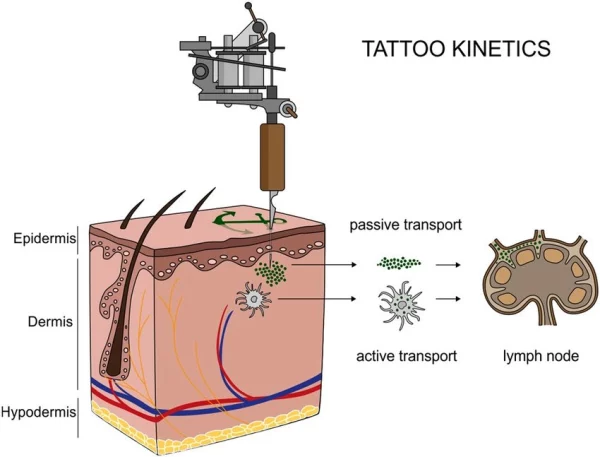Tattoos have become an integral part of modern culture, symbolizing personal freedom, special milestones, or simply a way to beautify the body. According to a survey by Pew Research Center (2023), 32% of Americans have at least one tattoo, with 22% owning more than one tattoo. However, beyond their aesthetic value, the potential health risks posed by tattoo ink have become a topic of much debate. Recent studies have shown that certain chemicals in tattoo ink may be linked to an increased risk of blood and skin cancers, making this issue a serious concern.
A study by Lund University, Sweden, published in eClinical Medicine (2024), found a correlation between tattoos and a 21% increase in the risk of developing lymphoma (a type of blood cancer). Data collected from 20,000 patients at the Swedish National Cancer Database revealed that chemicals in tattoo ink, particularly heavy metal compounds such as nickel, lead, and cadmium, may enter the lymphatic system. When nano-sized ink particles are absorbed by the skin, they can travel to the lymph nodes, causing the accumulation of toxins and affecting immune system function. This could be a factor that triggers cancer development, although a clear cause-and-effect relationship has not been established.
Additionally, Applied and Environmental Microbiology (2024) analyzed 75 tattoo and permanent makeup ink samples in the United States and found that 26 samples contained harmful bacteria like Staphylococcus epidermidis and Cutibacterium acnes. If these bacteria enter through the tattoo wound, they can cause severe, prolonged infections, leading to chronic damage to the skin or surrounding organs. While not directly linked to cancer, this chronic inflammation could increase the risk of cellular mutations, leading to serious consequences.

The mechanism of tattoo ink causing skin cancer has also been studied. Some tattoo inks contain substances like carbon black, azo dyes, or heavy metals. When exposed to sunlight or UV rays, these substances can break down into compounds that have the potential to cause cancer. In particular, azo dyes, when broken down, can create aromatic amines – a group of substances that have been classified by the International Agency for Research on Cancer (IARC) as potential carcinogens. In the UK, a report from the Public Health England (2023) stated that around 2-3% of people with tattoos report allergic reactions or chronic dermatitis, although the incidence of skin cancer related to tattoos remains much lower.
From the perspective of experts, using substandard tattoo ink is a key factor in increasing health risks. Studies have shown that 30-40% of tattoo inks on the global market are not strictly controlled for chemical composition, leading to the possibility of containing dangerous compounds. In one study in the United States, the rate of people experiencing serious side effects after getting a tattoo was 5%, with 0.5% reporting prolonged infections lasting more than 6 months. This increases the risk of developing chronic skin damage and cell mutations.
However, the risks associated with tattoos can be significantly reduced if you choose a reputable tattoo studio and use inks that meet safety standards. Public Health England (PHE) recommends that consumers research the origin and ingredients of tattoo inks, avoiding products with unclear sources. Proper aftercare for tattoos is also crucial, including correct hygiene, avoiding direct sunlight, and using sunscreen when necessary.

Tattoos are a way to express individuality and tell a personal story, but understanding the health risks can help you make a safer, more informed decision. Choose licensed tattoo studios, demand the use of inks that meet safety standards, and follow aftercare guidelines to ensure long-term health protection.
“Although the risk of cancer from tattoo ink is considered low, the accumulation of nano-particles in the lymph nodes and prolonged exposure to toxic chemicals could increase the risk of serious health issues.” – Dr. Milena Foerster, International Agency for Research on Cancer – WHO


HPX24h > Health > Chemicals in Tattoo Ink: Are They Linked to Blood and Skin Cancer?
Tagged Articles
Stem Cell Therapy for Lung Cancer: A New Hope Entering Human Trials
Chemicals in Cosmetics That Could Increase Breast Cancer Risk – Did You Know?
Top Reads from This Category
Health
What Does a Right-Side Headache Indicate About Your Health?
Health
5 Tips to Help You Overcome Smartphone Addiction
Health
Step-by-Step Guide to Safely Relieving Bloating in Children
Health
Chemicals in Cosmetics That Could Increase Breast Cancer Risk – Did You Know?
Health
Daily Habits to Naturally Manage Blood Pressure Without Medication
Health
Fruits That Can Spike Blood Sugar Levels: Be Cautious
Health
Playing with Dirt: The Surprising Secret to Children’s Health and Immune System
Discover New Topics
Science
AI Can Make Life Easier, But Is It Harming Your Ability to Think Critically?
Science
New Discovery: How the Brain Manages Emotions and Memory
Fitness
Effective Workout Tips: The Best Full-Body Exercises for Health
Space
Scientists Believe Water Ice Could Exist on the Giant Asteroid Vesta
Space
Gamma Ray Bursts and the Key to the Chemical Composition of the Early Universe
Science
The Science of Measuring Biological Age: New Discoveries About the Aging Process
Animals
Baboons With Stable Relationships Live Longer and Show Greater Kindness
Fitness
HIIT Training: A Long-Term Remedy for Brain Health
Science
Artificial Intelligence Outperforms Humans in Treating Depression
Science
Successful Penis Transplant Surgery: A New Breakthrough in Medical Science
Parenting Tips
Causes and Solutions for Aggressive and Strong-Willed Behavior in Children
Health
The Best Days to Get Pregnant: How to Accurately Time Your Ovulation?
Healthy Eating
Why Do We Crave Sweets? A Scientific Perspective on Food Cravings